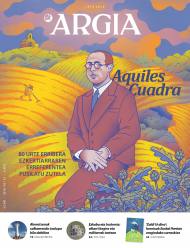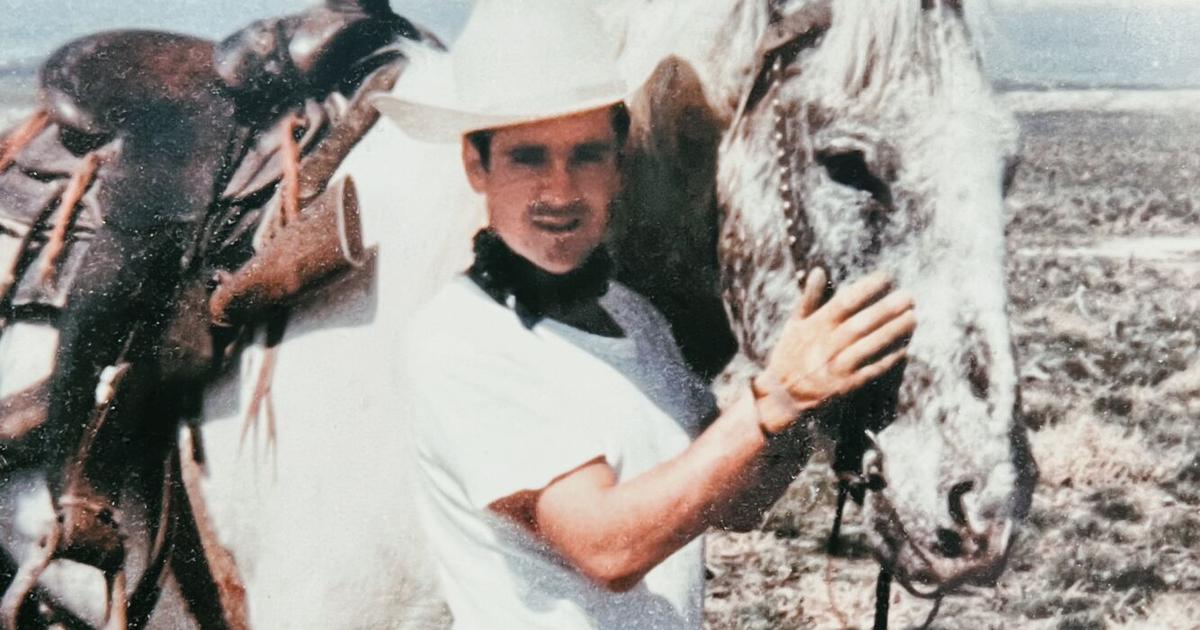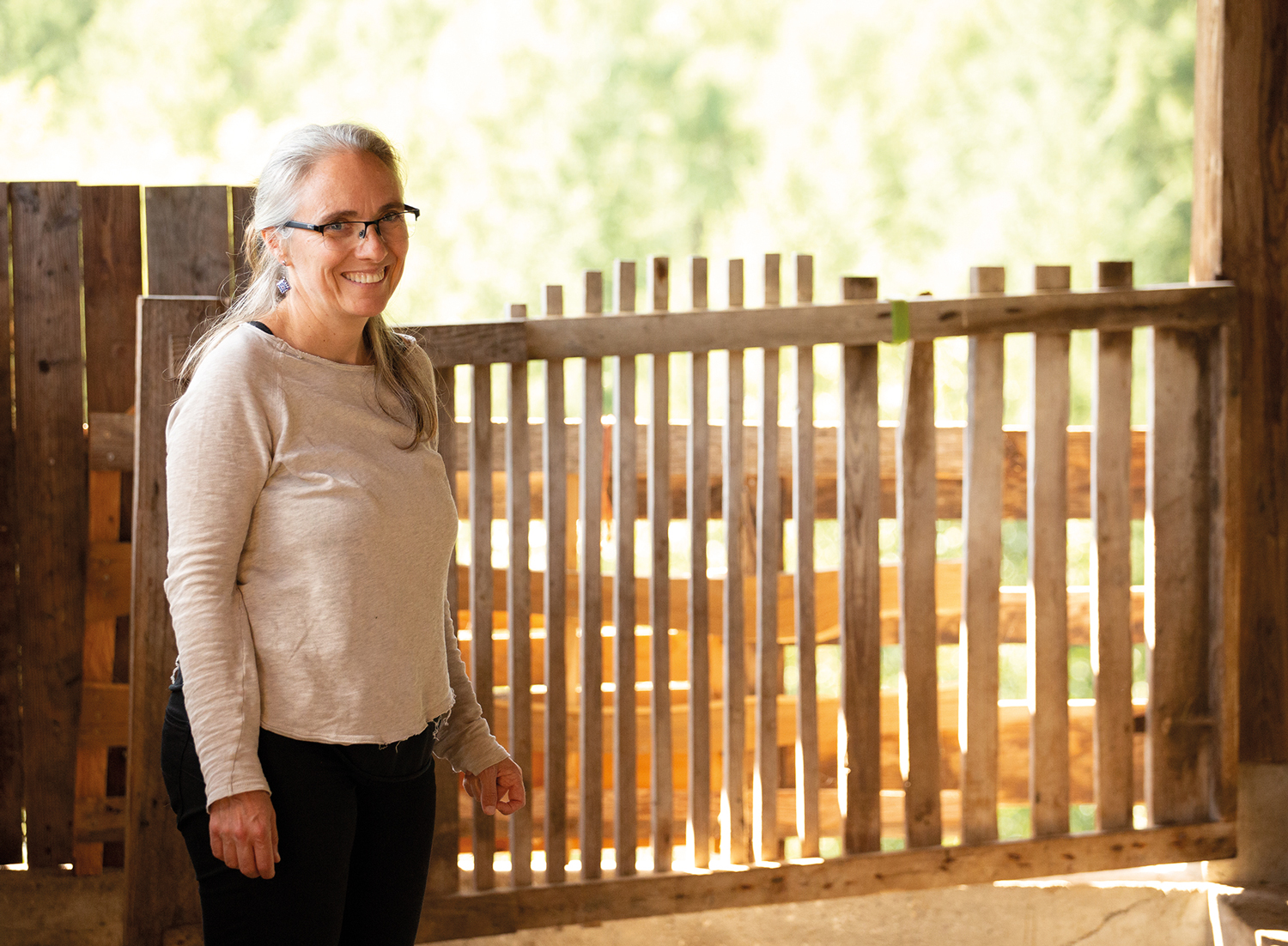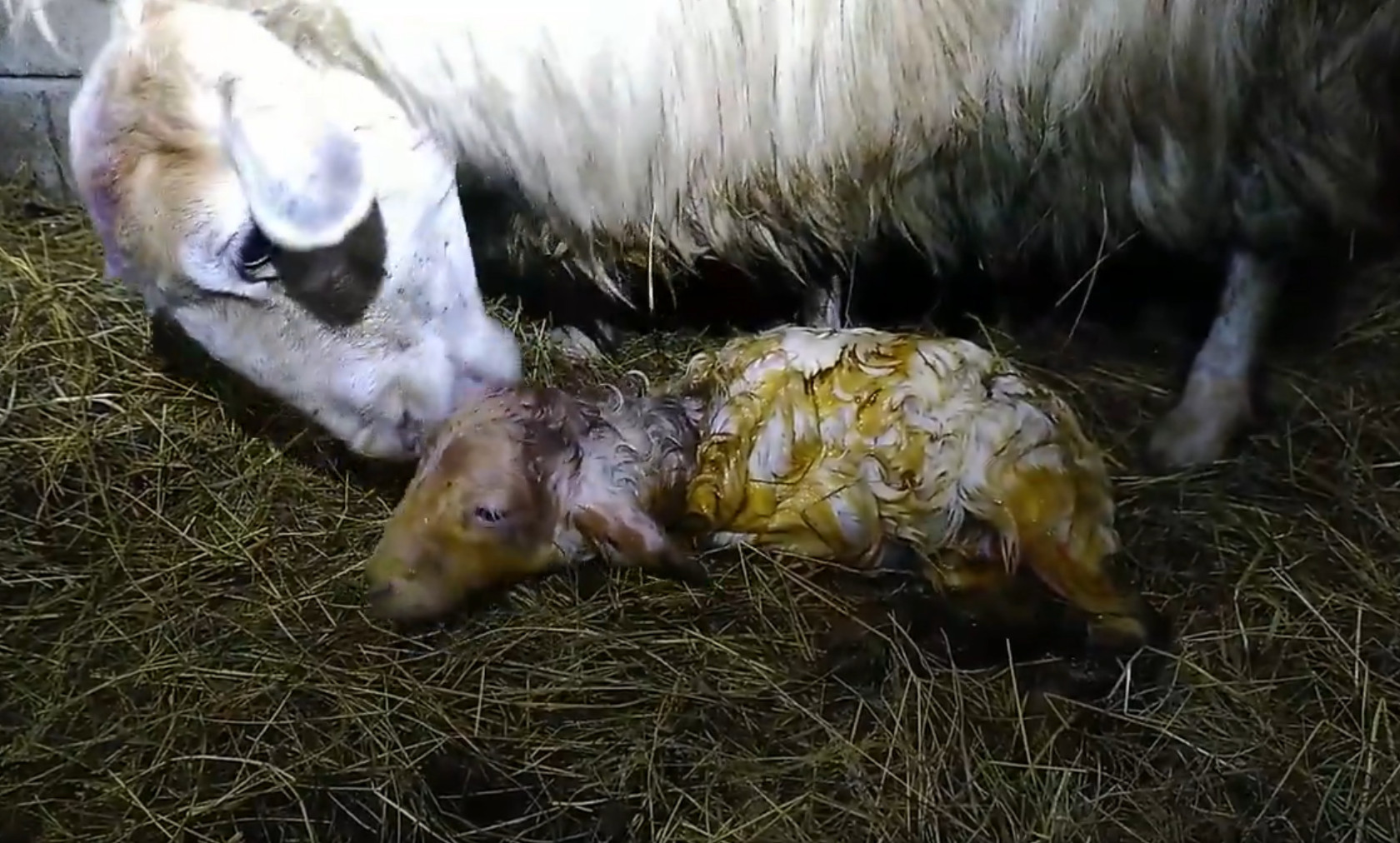"Whether or not the awards come, the important thing is to sell the cheese of the year."
- Homemade latxa sheep's milk, the lambs' natural flap and cleaning are the secrets of the infernal gas that has won the most important awards in the cheese contests of Ordizia and Uharte Arakil in the last two years.
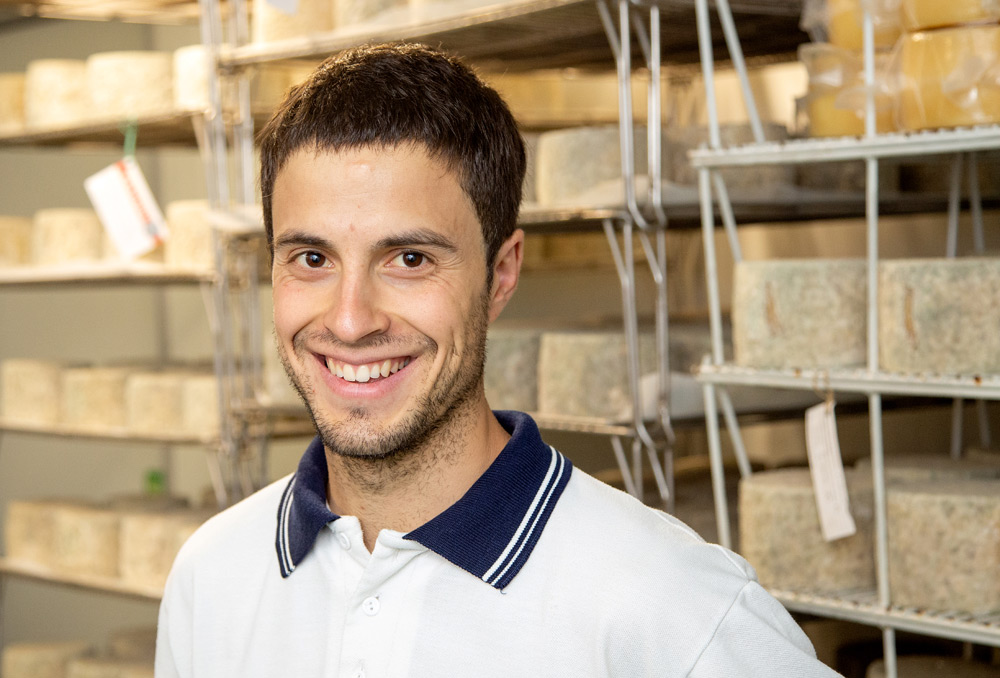
Baztango bazter urrun bezain ederrean dago Orabidea eta hango Kortariko Bordako semea da Julen Arburua, artzain eta gaztagilea. Arantzazuko Artzain Eskolan ikasi ondoren, etxeko negozioa eraldatu eta ardi eta behi esnea saltzetik, gazta artisaua egitera egin zuten saltoa, Idiazabal jatorri izendapenaren barruan. Julen Arburua da Ordiziako Idiazabal Gazta Txapelketa inoiz irabazi duen gaztagilerik gazteena. Bi urtez jarraian irabazi du Ordiziako saria, baita Uharte Arakilgo txapelketa ere. Iaz Kortariko gaztak urrezko domina irabazi zuen Espainiako Gourmet Gazta lehiaketan, eta brontzezkoa World Cheese Awards lehiaketan, Norvegian. Abuztuan Londresen prestigio handiko Great Taste lehiaketan bina izar lortu zituen bere ardi gazta naturalarentzat eta ketuarentzat.
What exactly are you doing this morning?
In the morning we brought cow's milk, we pasteurized it and then we put it in this large bowl. After we dropped it to 30 degrees, we gave it the flap. After 45 minutes, it hardens, settles like a pulp and mixes well and heats up. Cow cheese is made once or twice a week and sheep cheese is made between December and August, every two days. There's always something to do here. Now is the quietest time, but there is always work.
How does the cheese calendar look like?
The toughest months occur between November and August. November is the beginning of the time when lambs are born and then, in December, we started making cheese. Every day we have to milk the sheep in the morning and in the evening, and once or twice a week we make cow cheese. In these months there is no lack of work: to take care of the deliveries, to bring the sheep to the grass, to bring, to make cheese, to distribute… Everything ends in August.
For the second consecutive year you won the Cheese of Huarte and Ordizia championships. Happy with the prizes?
Yeah, that's a lot. It's a joy for everyone to win at a place like Ordizia. You can say it's like a dream. We didn't think about anything and we're comfortable. Last year we had a very good year, and we worried that this year we had trouble keeping it, and we were happy. This was the fifth campaign.
How did they decide to set up the cheese factory?
Parents have always lived from the farmhouse, selling cow's and sheep's milk. Amatxo made cheese, but only for home, about 40 grains. It was my idea to stay here, but I saw that that way you always depended on another. If you get a little squeezed, you can fall upside down. We've worked the product and we've done the whole cycle. It's a lot more work, but before you lived two, and now we're four, two brothers and two parents. The yield is higher and can live with almost less animals. We have 350 Latxan sheep and about 40 cows, and we make about 12,000 kilos of sheep's cheese and 4,000 kilos of cow's cheese a year.
The milk, the flap… What is your secret?
Everything. First of all, we are trying to get milk as clear as possible. We clean the sheep one by one before milking. It's a lot of work, half an hour in the morning and a little more in the evening, but we know that to get a high-quality cheese, cleaning is very important. In the udder it always comes a little bit of dirt and if you put the machine without washing it all goes into the milk. We consider cleaning very important. In addition, it is very important that sheep graze abroad for as long as possible and that they be made with a good natural flap. We used the flap of our lambs, we cut it off and frozen it all year round. These are the three biggest secrets.


So, do you make cheese like a thousand years ago?
Igualtu, the only difference is the new instruments. It's all stainless steel. Wood is no longer used. We now have tools to measure the degree of acidity, the temperature, the weight -- and the mom was doing everything about it. The thermometer was then a little finger. Otherwise, everything is the same. We control everything with new systems, but all raw materials are natural, as before. The process is the same, but to maintain regularity throughout the year, we use these appliances and the refrigerator. So, all the lots are different, but they always go in the same line. It is compulsory for the consumer.
What did you learn at the Arantzazu Pastors School?
I like cows, but sheep always draw me more. I knew more or less how to do the work, and there I learned new methods. We would visit the farms and get each one an idea to make it mine afterwards. In school, you learn theory and practice. The milk of each house is different, so even if it is done in the same way, a different cheese will always come out. You have to try your milk eleven times until you get it right, and then go down that path. We are happy. In the first two years we had a hard time taking the march, but now we are very comfortable. The hardest thing is already done. Whether or not the prizes come is something else, the important thing is to sell the cheese of the year and ensure what we need to live.
Why did you enter the Idiazabal designation of origin?
It's a good way to sell cheese overseas, because it's well-known. They've done an impressive job. Thanks to them, today it is located in the place where the Latxa sheep is located, otherwise the external breeds would have gotten in and the Latxa had disappeared. In the end, everything is a chain: we take care of the fields and sheep and, as a result, we make quality cheeses. For us everything is an advantage. Now our cheese is very well known all over the world. This is possible thanks to the work done by the pastors of the past.
They say making cheese isn't easy, but it's really hard to sell cheese. Do you agree?
No. We started to be afraid of it. The first year, we didn't make a lot of cheese, because everybody said the same thing. But if you try to make a good product and you're passionate about it, you'll eventually get it, and at least you'll sell it. If before or after people try it, fame will spread from word to mouth.
The brand with infernal gas is very striking. Does that also help?
We didn't know what to put in, and in the end, as it is here, we took the Hell Mill and the Hell Mill and the area of the same name. Looks like we've been right, right? It's not an easy name to forget.
If this is hell, what are you, hell?
Maybe it is!
The Food Oscar is the awards given at the Great Taste in London, and you have won four stars this summer.
Yes. There are 12,000 food items from all over the world. We sent two cheeses and they gave us two stars, and we were happy. The arrival of these rewards on the outside also has a lot of value.
Do you sell live cheese right here at the Borda de Kortari?
Yes. It looks like we're far away and we didn't think a lot of people were coming, but like the Hell Mill, the Etxebertz Borda Restaurant and some rural houses are nearby, and in summer there are so many tourists in Baztan, a lot of people arrive, especially in August. Anyway, most of the production is sold in shops, restaurants and rural houses in the area. Now, on the occasion of the Ordizia prize, Gipuzkoa has begun to demand a great deal. We used to do a lot of trade shows, but this year only recently, just five or six, because we're selling it really well.
What is life like here for a young man like you? Do you work all day?
I have fun. It is our hobby and we wanted it. Every now and then, in summer, I feel at ease for a week, but I come home very willingly. Now we're four and we get along. Before, only the parents were there and it was harder to fix it.
Have you been born here?
Yes.

the company consists of Julen, his mother Maddi, his father Antonio and his brother Paulo. Photo: Dani Blanco
And how did they manage to go to school as a child, for example?
First I would come with Dad and Mom, and then I would come in a taxi to take all the kids in the neighborhood. We were nine in total. First to Elizondo and then to institute, to Lekaroz.
What are the challenges facing the future?
Continue to do so and see if more young people are encouraged to work together and to strengthen the sector. Otherwise, I'm happy. The company is medium-sized. In winter there are days that don't end, but it's portable. Some say that if you sell it so well, maybe we should do more, but if you do more, you can't get it all right and the quality is low. There is a limit and things have to be done right.
Another way to increase performance can be to raise the price. After so many awards have you risen?
A little bit. We are now selling the kilo at EUR 20 and a half and EUR 21, here in the store.
Do they do the whole process and distribution?
Yes. Mediators have come who have wanted to take that job, but if we entered that cycle we would return to the previous cycle of milk: we work and we win another. It is better to do it a little less and complete the cycle. The performance stays at home and you don't miss half on the way.
What was your first prize?
The annual competition for sheep, dogs and cheeses is held in Amaiur on 15 August. When I was 12 years old, I wanted to go and my grandmother prepared the cheese to take me. We went and won. I've always had a passion for sheep and cheese. In 8 or 10 years, they bought me a small bowl and left my cows easier for me to milk.
What is Hell like?
When they come to visit, they are scared to see the road, because it has curves, because it’s narrow… but they say it’s a wonderful landscape. On the other hand, there are things to improve: we have the internet, for example, but we don't work with phone coverage. Some of them come and say: “Good without coverage.” When you don't need it, it's elegant, but when you need it not so much.
And to live?
Although some have come from outside, you usually need to have been created here to live here. I don't even want to think about the madness of the city. When I go to Donostia to do the cast, I can't park it puts me in a bad genius.
Many young people want quiet and safe jobs. Wouldn't you be an official?
It wouldn't last, I'm clear.
Garai “lasaian” joan omen gara Kortariko Bordara. Julenekin zutik mintzatu gara denbora guztian, handik hona haren atzetik. Gurekin solastatu bitartean gazta egiten aritu da, dena urez txukun garbitzen, bezeroak artatzen... Elkarrizketa hasi aurretik hamar minutuz desagertu da ilea mozteko, gaur Kortarian ile-apaintzailearen bisita zuten eta. Hura bai mugimendua!
The day of the pastor of Huarte explained that Euskal Herria has been awarded the recognition to participate in international sheepcutting competitions. The officiality occurred at the 2023 World Championships in Scotland, as a result of the dossier presented by the Basque mozas... [+]









